
Level Up Your Business Today
Join the thousands of people like you already growing their businesses and knowledge with our team of experts. We deliver timely updates, interesting insights, and exclusive promos to your inbox.
Join For Free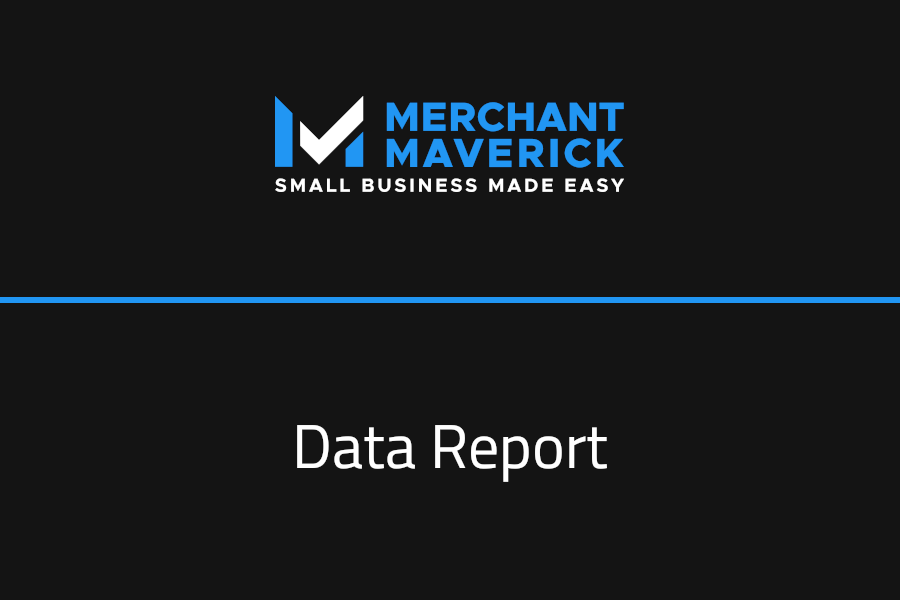
If you’re a startup west of the Mississippi, you’re already headed on the path toward entrepreneurial success, according to our inaugural Merchant Maverick “Best States For Women-Led Startups in 2021” report.
The genesis of our report was simple: We wanted to determine which states are best (and which are worst) for women-led startups, a sector of the economy that’s seen substantial growth in recent years. And, even though startups led solely by women eclipsed the $17 billion mark nationwide in venture capital funding in both 2018 and 2019, we quickly found not every state offers the same opportunities.
So what do the numbers say?
By and large, the tale of the tape is pretty straightforward: the part of the country that lies west of the Mississippi is great for startups led by women entrepreneurs. Per our overall ranking, seven of the top 10 states hail from the West, including the top two: Colorado and Washington.
As a whole, the top 10 states fare particularly well when it comes to engaging women entrepreneurs — 1.7% of all women in these states are self-employed in their own business, which compares favorably to the national average of 1.4%. The top 10 also see better-than-average rankings in terms of how many employees their women-led businesses hire. When looking at our “percent of those employed by women-led firms” metric, none of the overall top 10 is ranked worse than 19th and six manage to crack the metric’s top 10.
On the flip side, several states in the Great Plains, Midwest, and South seem to struggle in offering women entrepreneurs similar opportunities to their male counterparts. In many cases, these lower-ranked states receive inadequate amounts of capital for venture-backed startups led by women. They also struggle to match the gender parity seen by higher-ranked states.
Our methodology is explained in more detail below, but here are the basic metrics we explored for this report:
Of course, we can’t write this report without giving proper weight to the effects of COVID. The pandemic has changed the economic landscape over the past year, and often for the worse. This means that not every metric may be able to accurately gauge how a state might fare amidst the pandemic. To help factor in COVID’s impact, we included some metrics that take 2020 into account, but it will be a while until we get a full picture of the pandemic’s devastation.
Table of Contents
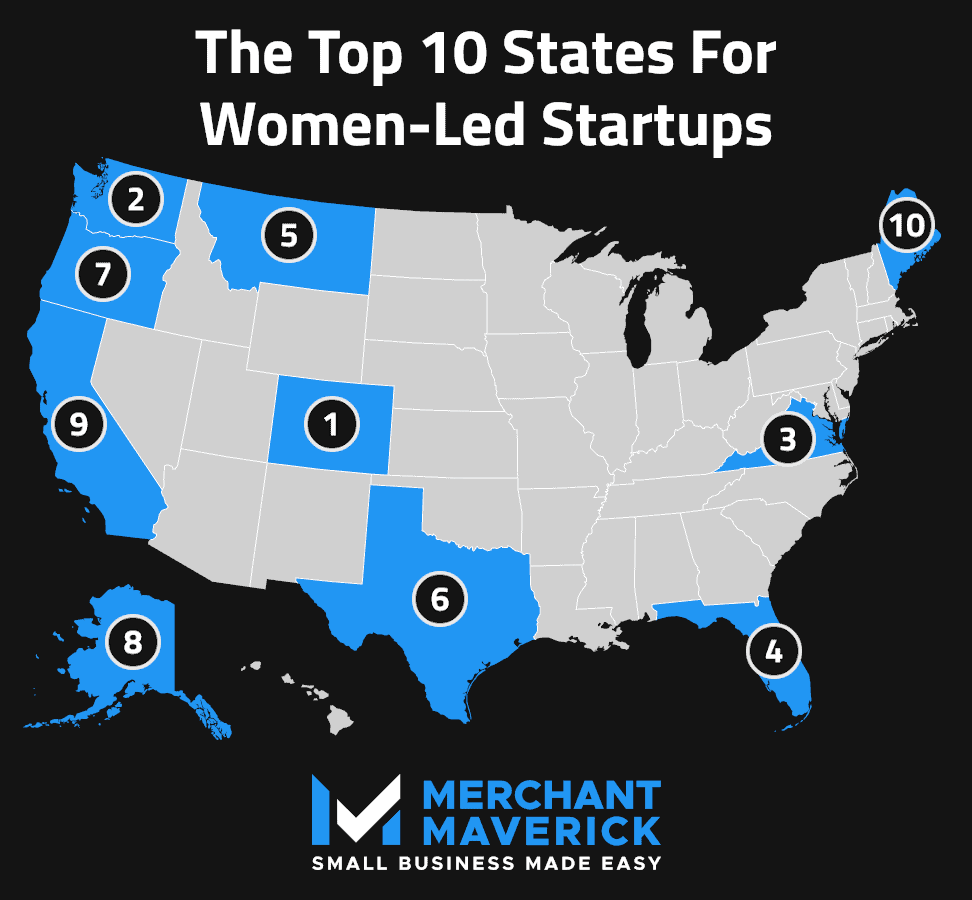
While the West has certainly stolen the show, the top 10 list still includes a few states outside that geographic area. Unsurprisingly, all offer relatively good gender parity for entrepreneurs. Some stand out as solid states for startups, while others feature tantalizingly low state income tax rates.

Score: 68.6
The top two states are in a league of their own, and for good reason. Colorado, home to budding startup scenes in Denver and Boulder, simply out-classes most other states beyond No. 2 Washington. Most notably, Colorado ranks in the top 10 in four out of our five gender-specific metrics. This includes engagement among women entrepreneurs (2.19% of all women in the state run their own business) and venture capital funding ($485 million in VC money went to Colorado startups led only by women in the past five years). Both those numbers rank fourth nationally in their respective metrics.
Beyond both those impressive stats, the Centennial State ranks highly when comparing female business leaders to their male counterparts. 27.7% of employer firms in Colorado are led by women (fifth nationally) and 19.9% of employees in the state work for women-led firms (eighth nationally).
In addition, Colorado features a minimal state income tax that maxes out at a relatively paltry 4.6%. And while not directly included in our metrics, the state’s up-and-coming startup hubs can make for an appealing alternative to the always-pricier Silicon Valley in nearby California.

Score: 67.0
A longtime host to a number of tech-focused companies, Washington joins Colorado as one of only two states to place in the top 10 in four out of our five gender-specific metrics. In particular, 28.2% of Washington employer firms are led by women. That number is good for fifth in the country.
For other leading numbers, Washington comes in at sixth for the percentage of employees employed at women-led firms (20.0%) as well as the amount of capital invested into venture-backed startups led by women ($398 million over the last five years). The state also does a good job engaging women entrepreneurs — 1.66% of all women in Washington are self-employed in their own business.
The Evergreen State also lacks a state income tax, which could be enticing for many entrepreneurs. Looking beyond the numbers, Washington has also proven to be a solid alternative for startups looking for a nearby home outside of California.

Score: 61.8
While North Carolina is often seen as an emerging tech hub, it looks as though Virginia is leading the South Atlantic’s gender parity push. Virginia has a few standout metrics by our count, with none really posing as a weakness. For instance, the state tops the rest of the country with a whopping 90.5% startup early survival rate (over six percentage points higher than second-place Massachusetts).
In terms of gender-specific metrics, 27.0% of businesses in Virginia are run by women and 20.0% of all the state’s employees work for women-led firms. Both those numbers place solidly in the top 10 of their metrics (ninth and seventh, respectively). It’s also noteworthy that the Commonwealth has a 5.3% unemployment rate, which trails only Montana’s 4.9% among the top 10 states.
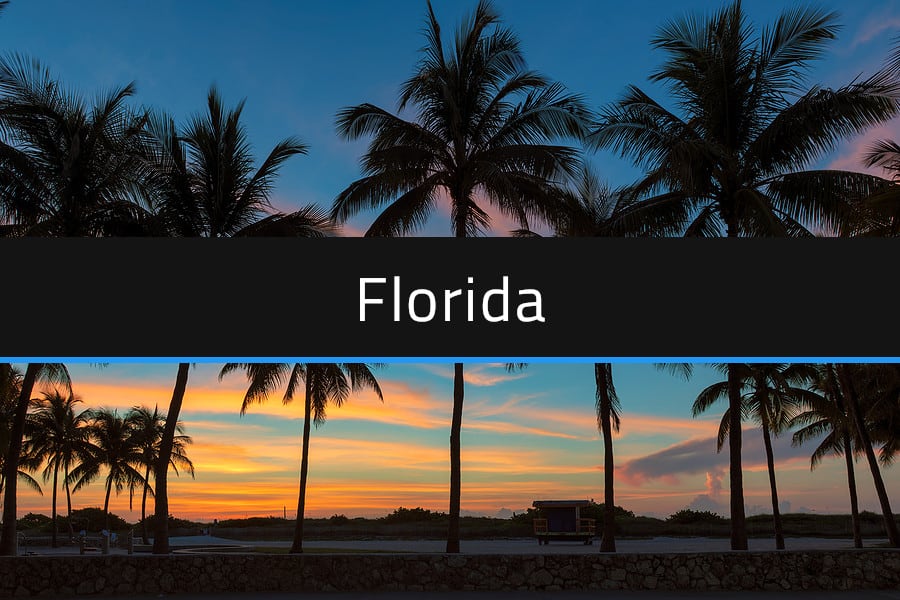
Score: 61.5
Florida makes waves with strong entrepreneur engagement among women as well as with hefty VC funding. 2.01% of all women in the Sunshine State are self-employed in their own business (a number that’s 6th nationally). And the state’s VC funding towards women’s startups also clocks in the top 10 with $219 million generated over the past five years. Plus, Florida features no income tax.
Of course, there are a few areas where Florida could do better. Self-employed women business owners only average a yearly income of $57,871 (27th nationally) and the state’s 6.5% unemployment trends a bit high.

Score: 60.8
Montana might not be first on people’s minds when it comes to good places to launch a startup, but the state posts excellent numbers favoring entrepreneurial women. Compared to the rest of the country, Montana features the second-highest rate of women business owners and the second-highest average income among those women business owners: 2.41% of all women in Montana are self-employed in their own business, and those women make an average income of $85,064.
Unfortunately, venture capital is almost non-existent for women-led startups in Montana. In the past five years, the state has only seen $90K in venture capital go to startups led solely by women.

Score: 56.2
As an economic powerhouse, it’s not a shock to see the Lone Star State high up in these rankings. Texas has the fifth-most employees working at firms run by women at 20.1%. The state has also received $365 billion in VC funding for women-led startups in the past five years, a number that ranks seventh overall. Texas’ lack of an income tax doesn’t hurt, either.
Still, Texas falls somewhat short in engaging women entrepreneurs — just 1.27% of all women in the state run their own business — and the $55,907 average income for self-employed women business owners in Texas ranks a lowly 31st.

Score: 56.0
At first glance, Oregon looks pretty similar to its northern neighbor, Washington. This state puts up great numbers in terms of gender parity: 21.8% of employees in Oregon work at businesses run by women, helping the Beaver State rank third overall in the US on this metric. Oregon also boasts 27.5% of employer firms run by women, while 1.67% of all women in the state are self-employed in their own business, numbers that rank sixth and seventh in their respective metrics.
The one big difference between Oregon and the higher-ranked Washington? Oregon has one of the highest income tax rates in the country. At 9.9%, Oregon’s highest tax bracket is the 47th highest income tax rate in the country — a far cry from Washington’s 0% income tax.

Score: 55.9
Pound-for-pound, Alaska stacks up well in gender parity metrics. The state leads the country in one important respect: 29.8% of all its employer businesses are run by women. Meanwhile, an impressive 22.7% of employees work at those women-led businesses, causing Alaska to rank second only to one other state in this metric. When you couple those stats with a lack of state income tax and an 81.8% startup early survival rate, it’s hard to overlook the Frontier State.
Alaska struggles to engage women entrepreneurs, however. Just 0.96% of all women in the state are self-employed in their own business, a number that trails the rest of the top 10 by a wide margin.

Score: 54.8
As the home of Silicon Valley, California is a hotbed for startups. When it comes to venture capital investment, California leads the country, with a staggering $3.9 billion poured into startups run solely by women. Startups are able to use that money to survive — 81.3% make it past their first year, making California rank sixth nationally in this respect. Self-employed women business owners also average $74,438 per year in the Golden State, which is also sixth highest in the nation.
California does impose a hefty income tax, though; at 13.3% residents may wind up paying more state income tax here than anywhere else. And the state’s 9.3% unemployment rate pushes California 46th in the nation.
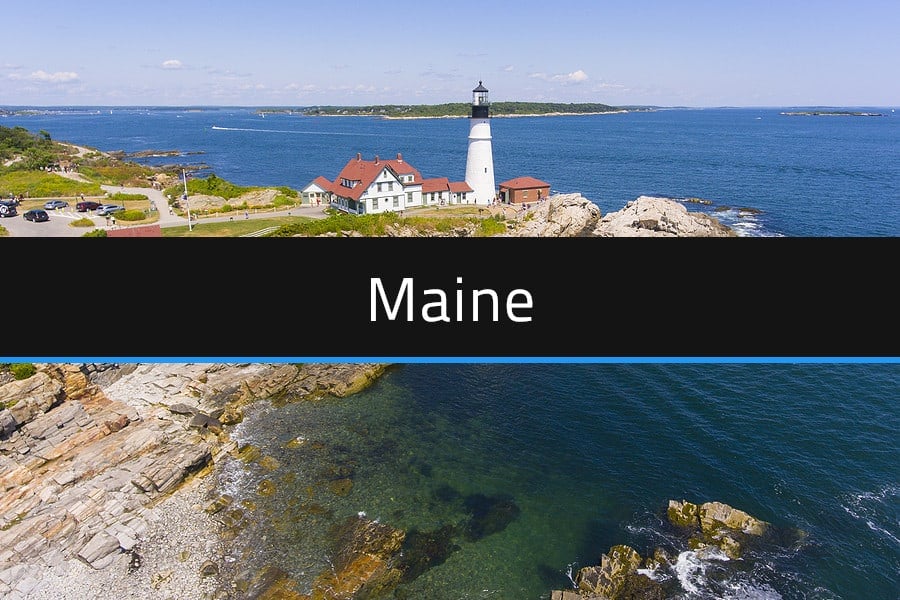
Score: 54.7
Rounding out the top 10 is Maine. This state fares particularly well in terms of engagement for women entrepreneurs and average income. Maine ranks fifth overall for the percentage of women self-employed in their own business, at 2.06%. With a $75,760 average income for those business owners, Maine ranks fourth in the country.
However, capital for venture-backed, women-led startups hasn’t been stellar. Maine startups led solely by women have only received $6 million in funding in the past five years. The state’s 7.2% income tax is also the 41st highest.
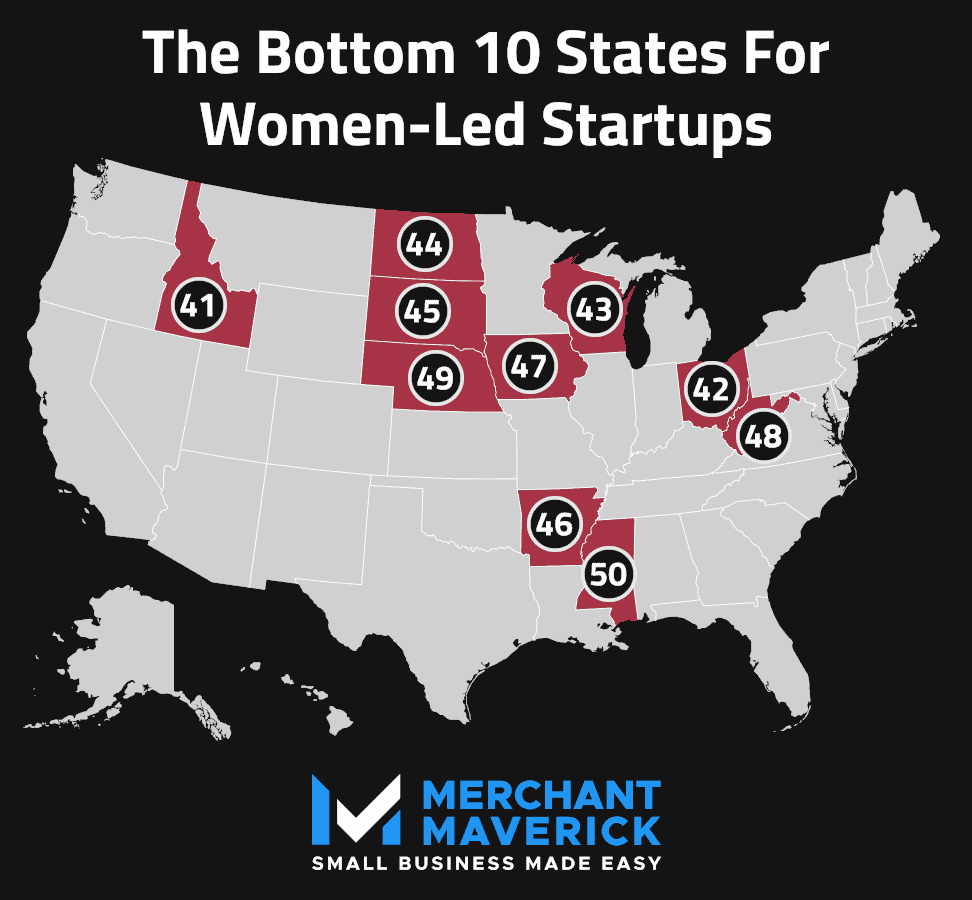
Now that we’ve deep-dived into the best-of-the-best, let’s take a look at which states wound up at the bottom of our list:
41. Idaho… Limited venture capital investments, low average income, and a higher-than-average income tax rate place Idaho just inside the bottom 10.
42. Ohio… A lack of high-ranking metrics means Ohio can’t be rescued from some pitiful numbers — only 0.90% of all women in the state are self-employed in their own business.
43. Wisconsin… The Badger State isn’t necessarily terrible in any one metric, but no single metric stands out. In fact, Wisconsin has only one modestly decent result: Its 5.7% unemployment rate is ranked 22nd.
44. North Dakota… Generally all over the board, three metrics contribute to North Dakota’s bottom 10 ranking: venture capital investments into women-led startups (ranked 47th), percent of employer firms run by women (48th), and percent of employees employed at women-led firms (48th).
45. South Dakota… The state is dead last in percent of employer firms run by women and the average income of self-employed women business owners. It’s also 49th in percent of employees employed at women-led firms. However, no state income tax and a 3.6% unemployment rate help slightly salvage the home of Mount Rushmore’s overall ranking.
46. Arkansas… This state manages to break the top 30 in just two metrics: percent of employer firms run by women (ranked 27th) and unemployment rate (28th).
47. Iowa… While Iowa sits in the top 10 for unemployment rate and startup early survival rate, the state’s poor gender parity and a high income tax rate position it squarely in the bottom 10 overall.
48. West Virginia… With only 20.1% of employer firms in the state run by women and $0 in venture capital going toward women-led startups, the Mountain State puts up an overall lackluster performance.
49. Nebraska… Despite having the lowest unemployment rate among all states, Nebraska struggles mightily with gender parity — just 13.3% of employees in the state are employed at women-led firms, a number ranking firmly in last place.
50. Mississippi… The Magnolia State finds itself in the bottom 10 in almost every metric. However, there is one bright spot: Mississippi’s 80.5% startup early survival rate is eighth-best in the country.
For this report, we gathered data from eight separate metrics for all 50 US states. The data for each metric was normalized from 0-100 so that the highest-ranked state within a given metric had a score of 100 and the lowest-ranked state had a score of 0. These normalized scores were then multiplied by specific weights to achieve the overall score for each state.
Our data was pulled from six separate sources:
To best determine the best states for women-led startups, we chose these metrics:
While most metrics consider data from before 2020, two incorporate data from this past year: venture capital investments and unemployment rates. Both these metrics are current as of October 2020. Such current data helps provide some insight on how COVID might have impacted women-led startups on a state level.
For the complete look at how all 50 states fared in our ranking, take a peek below:
While some states are certainly doing better than others, it’s clear there is still much to improve when it comes to gender parity within entrepreneurship.
Nationwide, just 23.8% of employer firms are run by women and only 18% of all employees are employed at those women-led firms. Self-employed female business owners also earn less money than their male counterparts. Our research shows that women business owners make $59,415 per year on average compared to the $103,047 that men make. Venture capital for women-led startups is also lackluster — PitchBook says that in the US just 2.7% of total capital invested into venture-backed startups goes to those led only by women. Grants specifically for women-owned businesses help, but can hardly fill the gap.
For the time being, it seems the West is making the charge at leveling the gender playing field. Alongside the seven states in the top 10, other western states such as Arizona, Wyoming, and New Mexico also put up respectable showings in our overall ranking. Hopefully, the rest of the country can follow this lead to make entrepreneurship a more inclusive sector of the economy — especially during the rebuilding process post-COVID.
Get in touch with a real human being on the Merchant Maverick team! Send us your questions, comments, reviews, or other feedback. We read every message and will respond if you'd like us to.
Reach OutGet in touch with a real human being on the Merchant Maverick team! Send us your questions, comments, reviews, or other feedback. We read every message and will respond if you'd like us to.
Reach Out
Let us know how well the content on this page solved your problem today. All feedback, positive or negative, helps us to improve the way we help small businesses.
Give Feedback
Want to help shape the future of the Merchant Maverick website? Join our testing and survey community!
By providing feedback on how we can improve, you can earn gift cards and get early access to new features.
Help us to improve by providing some feedback on your experience today.
The vendors that appear on this list were chosen by subject matter experts on the basis of product quality, wide usage and availability, and positive reputation.
Merchant Maverick’s ratings are editorial in nature, and are not aggregated from user reviews. Each staff reviewer at Merchant Maverick is a subject matter expert with experience researching, testing, and evaluating small business software and services. The rating of this company or service is based on the author’s expert opinion and analysis of the product, and assessed and seconded by another subject matter expert on staff before publication. Merchant Maverick’s ratings are not influenced by affiliate partnerships.
Our unbiased reviews and content are supported in part by affiliate partnerships, and we adhere to strict guidelines to preserve editorial integrity. The editorial content on this page is not provided by any of the companies mentioned and has not been reviewed, approved or otherwise endorsed by any of these entities. Opinions expressed here are author’s alone.